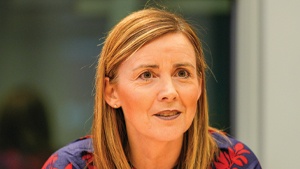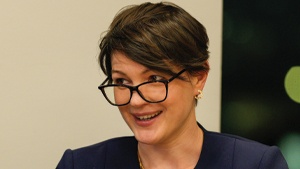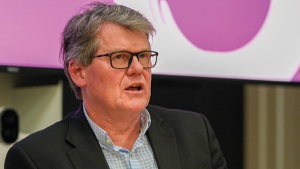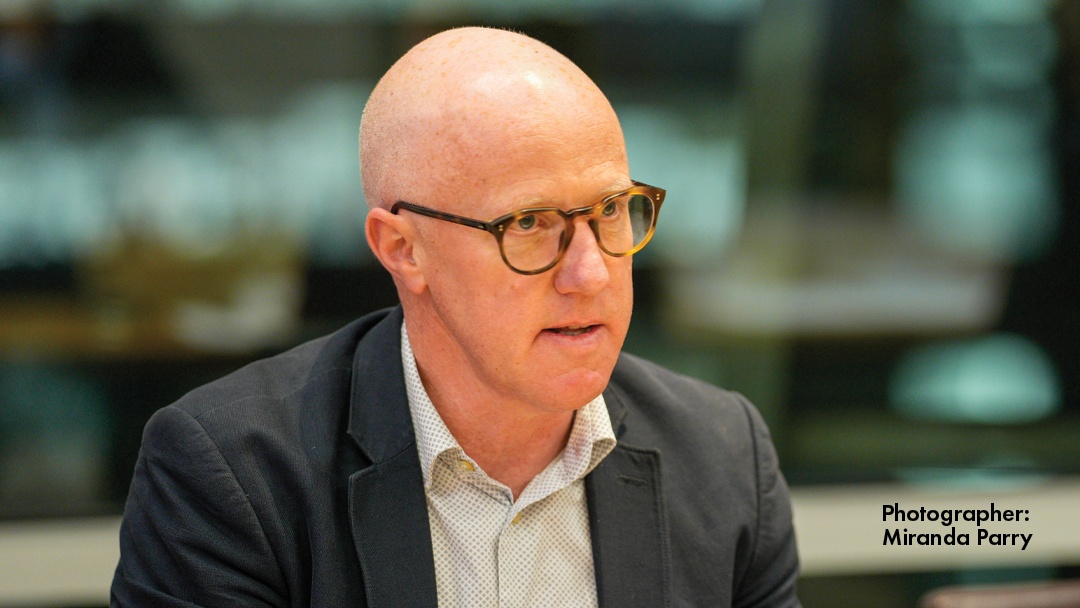Douglas Alexander, Pinsent Masons: I will first contextualise and attempt to define ‘soft power’ because, it is more often discussed than defined, and in that sense, I should probably declare an interest. In addition to many roles I hold, I have been a senior fellow at the Belfer Center in the Kennedy School of Government in Harvard over the last six years, and Joseph Nye, who coined the term ‘soft power’, has been a colleague of mine.
He coined the term in 1990. In his book called Bound to Lead; Joseph was convinced at the time that the kind of declinism that was abroad about the United States was not justified. He argued that it is a methodology more than a destination in terms of how foreign policy is used. In terms of foreign policy, soft power is the ability to get what you want through attraction or seduction, rather than through coercion or payment. When we think about power, it is ultimately the ability to influence others to get those outcomes that you desire.
If I was to try to identify what the three main attributes are in terms of countries and foreign policy, in essence a country’s soft power comes from three sources: its culture – and that’s obviously directly relevant for business as well – its political values, such as democracy and human rights, and indeed its policies. Joe Nye himself has now written about ‘smart power’ as being the judicious balance of hard and soft power. When I think about that, I think about another American. I think of Teddy Roosevelt’s statement about, ‘Walk lightly but carry a big stick.’ That, to me, is the essence of smart power, which is not denying the need for hard power, but recognising the influence that you can have.

Now, since Joe Nye developed that concept of soft power back in the early 1990s, individuals, companies, and countries have all found it a useful lens through which to exercise power. For individuals, charisma, emotional appeal, vision, communication skills; I think those are all pretty much attributes of soft power. In that sense, it strikes me that it is a concept that is of some significant utility when it comes to both how general counsel show up within their organisations, and how GCs can be effective within their organisations in terms of the outcomes that they are working towards.
Alastair Morrison, Pinsent Masons: I am intrigued by what organisations are looking to achieve, what their own objectives and purposes are, and what the role of GC or chief legal officer is, when it fits in with that.
Crises are not running in sequence anymore; they are running in parallel. When you think about that, you see that in-house legal teams have evolved to become more integrated within their businesses and less functional. Before, in-house legal teams were sometimes viewed by the business as the ‘abominable no-man’ and the department of, ‘no, not looking at this’. It is not soft versus hard, it is all these different things, but you start with the overall objectives of an organisation and what the organisation’s desired outcomes are, or what its outputs might be.
Douglas Alexander: For instance, in terms of talent retention, I was thinking attractiveness is not solely prescribed by how much you pay. How much do you think soft power is relevant in understanding the nature of why employers are attractive either as prospective legal advisors or even simply as employers?
Alastair Morrison: I think that comes down not so much to soft power but maybe soft influence, if that is the same kind of thing, Douglas. In our organisation partly why we have put such a huge amount of work into understanding why we exist, what our purpose is, what we exist to do, is because we could not say, ‘our purpose is as follows’ and go and dictate that to the business. We took 2000 inputs from across our business to understand what runs through our business, our code, if you like. If you then have that and if you live by that, then it informs you about who you are as a business and what you can do and how you can then develop a purpose.

Laura Cameron, Pinsent Masons: I completely agree. Our purpose and our values play a key part in the attraction and retention of talent, and that plays into our approach to ESG, DEI, other things in our culture that are relevant, especially to a younger generation coming through. It is not just our approach to that; it is the fact they want to know that we follow through with it.
Douglas Alexander: It is hard work in international affairs as well, because the efficacy of the values you hold helps you, whether you are judged on soft power or not. If you say, ‘we’re a liberal democracy’ but then you exhibit behaviours that challenge that, then your soft power influence goes down, and that would apply to individual businesses or ones at an international level.
Nigel Paterson, Currys: Alastair, in relation to GCs, I do not really understand what would constitute hard power.
Alastair Morrison: It is interesting, around the war of what you see in some organisations using coercion/ hard power in litigation or driving hard deals.
I do not think it can be a situation of just looking at where the soft power sits. The interesting thing about this balance of soft, smart and hard power is that there are examples such as organisations using coercion/ hard power in litigation, or their balance of power in a relationship to drive hard deals. There is sometimes a dislocation between the legal team and what an organisation is seeking to achieve.
Jeff Langlands, BT: It is a bit like that phrase that was used earlier, walking lightly but carrying a stick. You want to be seen as someone who gets things done for the organisation and understands that, but you also have the gatekeeper role there to play, albeit that is almost once in a lifetime, because you don’t want to be saying ‘no’ very often; you’d much rather influence and find a different solution than to say no or use the stick.
Mark Maurice-Jones, Nestlé: You don’t want to be known as Dr No or then you are finished.
Douglas Alexander: It seems to me the question therefore is, in legal education do we equip people with the negotiating skills that very senior lawyers require, or are you presumed to acquire that on your way up through the corporate ladder? It strikes me that even a lot of chief executives find themselves in positions with deep domain knowledge, but not necessarily the breadth of horizontal vision required for the broader responsibilities of stewardship. It seems to me quite often they rely on GCs to be able to provide some of those guardrails and some of those boundaries, not simply in terms of hard regulatory constraints of law, but more generally saying, ‘have you thought about this or thought about that?’
Mark Oliver, Heathrow: I find that interesting because I think that might have happened in the olden days of lawyers being in the ivory tower and you getting a carefully sculpted piece of advice from an external law firm and saying, ‘you can’t do it. There you go.’ I think everyone has moved, across the board, into a world where that is not acceptable in the business any more, and your success as a lawyer depends on finding the other ways, the ways around it, the things that you can do, the ways that you get to your aims.
Nigel Paterson: When you are a GC you realise that most situations you deal with are inherently ambiguous. I think in those ambiguous contexts you learn that soft power is much more relevant than hard power, because hard power needs the certainty of the guardrails and then you can exercise it, otherwise you are more reliant on navigating a way through and using those influencing skills to get to the right result.
Mark Oliver: That training point is important. For instance, we request that our panel firms send us a trainee. We do not do it because it is an easy legal resource, but we genuinely see the benefits of those trainees going back to the firms and knowing our business, having sat there, been next to the comms team, the regulatory team, the finance team, met the people, got the soft power, got the connections, and understood the bigger picture.

Anna Hart, Bank of China: I also wanted to comment on the point you mentioned, Alastair, which is that all roads lead to legal – that is increasingly the case. On so many projects, legal teams are being brought in and their views solicited. Why? Because in-house lawyers are viewed as competent, trusted advisers, with a valuable skillset including good analytical skills, and they are increasingly able and willing to offer a strategic view. As a result, legal teams are being asked to contribute to a much wider range of matters.
Mark Oliver: You fight so hard to get accepted and brought into the business and engaged, and then suddenly you get everything thrown at you and it is like, ‘oh god, I need a team twice as big to deal with all of this.’
Alastair Morrison: This is the fascinating thing for in-house lawyers. There are so many of these things that you can expose yourselves to, which I think comes as a consequence of being much more integrated and organic than it would have been in the past. Isolated, standalone legal departments are more of a curiosity now. It might be called the legal department, but it is much more integrated into a business now.

Mark Maurice-Jones: I think for me risk should be shared. I may not always be the decision maker, but for me my role as a lawyer in my team, it is about making sure the risk is transparent. The worst thing in the world is if someone comes to me later and says, ‘no one told me that could happen.’ I need to be transparent about the risks and I have given my strong recommendation. Quite often the lawyer is the best person to influence the ultimate decision since often the lawyers have a lot more experience and are better able to guide where the business should be going.
Jeff Langlands: But we are probably a little bit reluctant to step into that space, sometimes. We have just touched on it here – we have different perspectives around the table as to whether we are a decision maker. Every important decision has an element of risk or a risk lens on it. How comfortable are we putting our necks on the line, truly? Not just giving a recommendation, but actually saying, ‘do you know what, I’m probably as well placed as anyone to make that call, and so I’ll make that call and am comfortable being accountable for that.’
I think for our teams this can be a tricky area, because they may hear slightly conflicting messages on this. On one hand they may hear: ‘Look, resource is tight, we’re taking on these additional areas which is great – compliance, ESG, all those things – but as a consequence just stay in your swim lane a little bit, because we don’t have the resources to be out there doing everything for the organisation, and filling the gaps that emerge elsewhere.’ But on the other hand we are also saying to them: ‘Be a business partner, get stuck in solving business problems and don’t be too afraid to make decisions if you are the best person to make that decision.’ That can be a little contradictory for our people.
Anna Hart: Looking at it through the lens of soft power versus hard power, the moment that legal teams or GCs try to assume that role and try to make those calls, then you are arguably trying to flex hard power. In fact, the more that legal teams and GCs can choose to leverage their soft power, the more effective they are likely to be. Ultimately, you are saying to the business: ‘Look, this is your decision, but I am here to support you by giving you the legal advice as well as strategic and commercial recommendations.’ The more frequently you do that, the stronger the relationship of trust becomes. To me, I think that encapsulates the utilisation of soft power.
Nigel Paterson: It is a subtle thing to navigate, because obviously we get influence in a business, and we are given a right to speak at the table when we understand the business. I also think we have to recognise that our soft power comes also from our ability to analyse and to be objective. My CEO knows that lots of people round the table are representing P&L’s, whereas if he turns to me, he will get an unvarnished view, I am not trying to gild the lily in any way. I think it is a real balance because that objectivity is really important.
Alastair Morrison: Other than professional services organisations, Douglas, and you have interfaced with the odd one from time to time, how do you see these concepts of soft and hard power outside of the legal side of things? Do you notice this?
Douglas Alexander: I think there has been a power shift, undoubtedly, because with respect to various ages around the table, to our generation there was a willingness in private practice, whether in accountancy or law, to basically go for deferred gratification. I am just struck, in the various organisations I work in, how few new graduates are willing to trust that the institution is going to look after their career for them.
Alastair Morrison: And regarding smart power and MPs – have you seen much evidence of that, Douglas?
Douglas Alexander: After an election defeat in 2015, it was clear to me that your reputation and your relationships really matter in your job search. If lawyers pitching for business lose their reputation for domain knowledge and expertise, they can be as charming, engaging, sales-y as they like, but they are not going to get the business. Also, my sense for lawyers in an advisory role is that if you establish a relationship of trust, you have actually got more options to either say: ‘This is really difficult, and I’m not sure what the answer is, but trust me; I’m going to find out,’ or say: ‘This is a marginal call because we’re in an area of ambiguity, but there’s two options here, let’s talk it through.’
I was interested when you just mentioned relationship partners. What makes for a great relationship partner, they may have massive domain knowledge sitting behind them in an external firm, but what skills or attributes would they be looking for in that relationship partner? In both politics and the law, I would basically say reputation and relationships matter in determining the quality of engagement. If law firms don’t value these, they may have a great pitch, but they are not going to get the business.
Anna Hart: Absolutely, and I think it really ties into all of your comments, Douglas. It is the critical relationship where you expect there to be that depth of knowledge, both of your organisation but also, to a degree, of you individually as the GC or head of legal. The relationship partner needs to know how you work and how you operate. They should also be receptive to the GC giving context and background, and also guidance. For example, GCs might need to say, ‘look, this needs to be done differently this time. Listen to me, roll with the punches, I’ll walk you through this.’ The best relationship partners are able to flex their style and their approach and be adaptive to the needs of in-house teams and the organisation.
Douglas Alexander: When you were speaking, this did spring to my mind. How do you grow leaders who genuinely prioritise the purpose or the interests of the enterprise over the value they place on that relationship?
Mark Oliver: That is where your GC soft power comes from, though. It is also in the teams that you lead, because you cannot be across absolutely everything, but if you have a team that is unified and behind you and feeds you the information when you need it and makes sure you are not exposed in front of the board at any time, then that is a massive benefit to have.

Jeff Langlands: In your situation Mark, you are not incentivised like partners in a law firm; you are incentivised for the entire business to succeed – and maybe this is an outdated model, but I think, in law firms, the whole ‘matter origination’ versus ‘matter credit’ versus ‘doing the work but getting no credit’ as a partner drives behaviours. In-house you do not have that challenge, so you can be more collaborative. If you are confident enough to say, ‘I don’t know, but I know someone that does, and I’ll come back with them or with the answer from them,’ it’s a healthier, more collaborative environment. Until we reach that utopia of great collaboration, I think what drives collaboration, rightly or wrongly, to some degree is incentivisation.
Mark Oliver: We are all incentivised on the success of our businesses, not on your individual success. You said you have a partner lying awake worrying about a question that they cannot answer. That is not why they are lying awake. They are lying awake because they are worried that their client is going to take their business to another partner. Even worse, another partner at their own law firm. That is the real incentive.
Jeff Langlands: It comes down to using your soft power/ influence to drive the collaboration.
Douglas Alexander: Alastair, because you have affected quite a lot of change within Pinsent Masons, how much of that was due to hard power or how much due to soft power? In a professional sense as well, what works?

Alastair Morrison: With lawyers, soft power and influence is far better than coercion or hard power. The structures are by and large far flatter in professional services organisations than in corporates, and partners need to have their say. Ultimately, if your partners are not convinced you will not achieve your strategic objectives. Influencing through purposeful actions and demonstrating the value of objectives and strategy is far more persuasive.
The panellists
- Jeff Langlands, BT
- Mark Maurice-Jones, Nestlé
- Anna Hart, Bank of China
- Mark Oliver, Heathrow
- Nigel Paterson, Currys
- David Eveleigh, Serco
- Faye Goss, Lendlease
- Caroline Kenny, Meta
- Douglas Alexander, Pinsent Masons
- Alastair Morrison, Pinsent Masons
- Laura Cameron, Pinsent Masons
- Joe Boswell, The Legal 500


